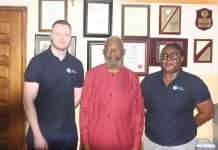
The Liberian government and a Nigerian organisation, African Diseases Prevention and Research Development Initiative have collaborated to reduce the burden of Tuberculosis in Liberia through electronic learning (e-learning).
This was disclosed on Thursday in Abuja at a capacity training programme organised by ADRAP for the Liberian delegation titled, ‘Bridging the Capacity Gap in Health Workforce through E-learning’.
The Chief Executive Officer of ADRAP, Dr. Josepth Enegela, explained that the Liberian delegation was in Nigeria to learn how to manage TB patients.
He said, “My organisation ADRAP is currently training health workers in Liberia on TB management, all virtual, so it’s e-learning.
“What they have come here to do is to also see and learn from other partners in Nigeria, whom we have trained through the e-learning platform to manage TB.
“For us, it is unique because all that we ever hear is that the people from Western countries come to train us but now, we are starting what we say is Africans training Africans, Africans learning from each other.”
According to Enegela, Nigeria and Liberia are among the 30 high-burden TB countries in the world and still a significant cause of morbidity and mortality in the world today, adding, “so it is very important to train people continually to deal with the disease.”
To achieve the desired result, he said that e-learning was the future of health workforce development in Nigeria.
This, he said is because in recent years, the African continent witnessed significant progress in healthcare and there was a growing demand for skilled health professionals.
Enegela said that the benefits of e-learning for health workforce development include accessibility and flexibility, cost-effectiveness, standardisation of education, interactive learning and peer-to-peer learning.
“The future of e-learning for health workforce development in Africa holds tremendous potential to bridge the healthcare education gap, address workforce shortages and improve health outcomes.
“However, numerous challenges such as limited resources, inadequate infrastructure, shortage of trained personnel and a background of increasing diseases burden abound.
“To address these challenges, e-learning has emerged as a promising tool to enhance health workforce development in Africa,” he said.
The Deputy Minister of Health, Liberia, Dr. Francis Kateh said that the TB burden was very high in the country.
According to him, the country was undertaking a sample with Montserrado County, which was densely populated and where almost 60 per cent of the TB burden of the country is found.
He said, “Based on that study, we are doing what we should to be able to have the actual number and based on the various categories, we are seeing what it is, but we think Liberia has had a major TB burden.”
According to Kateh, during the rainy season in Liberia, the country is completely cut off, so getting the necessary healthcare needs of the people to them is very difficult, hence the need to develop the capacity of health workers for such times.
“Even if you want to provide quality of care, you have to continuously build the capacity of the focal person on TB and HIV around the country.
“So what we want to learn from here is that we want to be able to send the technology that has been designed here to our healthcare workers.
“This is to see how they can use it to make sure that the healthcare workers that deal with these burdens are able to effectively and efficiently take care of the people that they serve,” he added.
The minister said that COVID-19 created a gap between countries in terms of training and building the capacity of care workers.
“So this innovative approach using a digital system to basically do continuous capacity building amongst health workers in order to provide quality health care services to the people is very critical.
“That is why we have come over here to see what you have developed here in Nigeria, learn from it, and partner with them to make sure that our people in Liberia are safe continuously”, he added.
The World Health Organisation Technical Advisor for Liberia, Dr. Moses Jeunrulon, said that healthcare workers face many challenges in the process of imparting knowledge.
According to him, learning is an ongoing process and bringing health workers together to learn sometimes comes with logistical challenges.
“So WHO after looking at all these and with digital technology advancement now, we are advocating more for innovations and digital technologies and solutions like this and we are even advocating now for e-health.
“With this training platform, we stand ready to support you, engage you and partner with you to scale this up across the continent.
“So the lesson for Liberia, we are starting with seven modules and the lesson from Liberia will be shared with the region so that others can build on it”, he said.
(NAN)











[…] post Liberia, Nigerian Organisation Collaborate to Reduce TB appeared first on […]